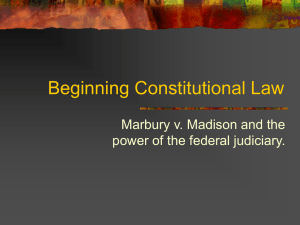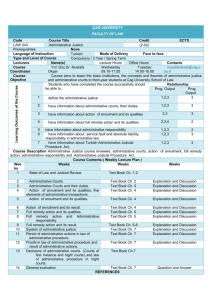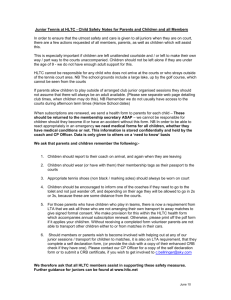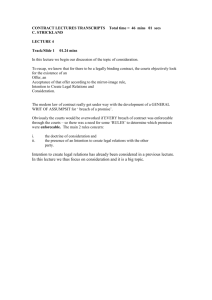US district Courts are Article III courts
advertisement
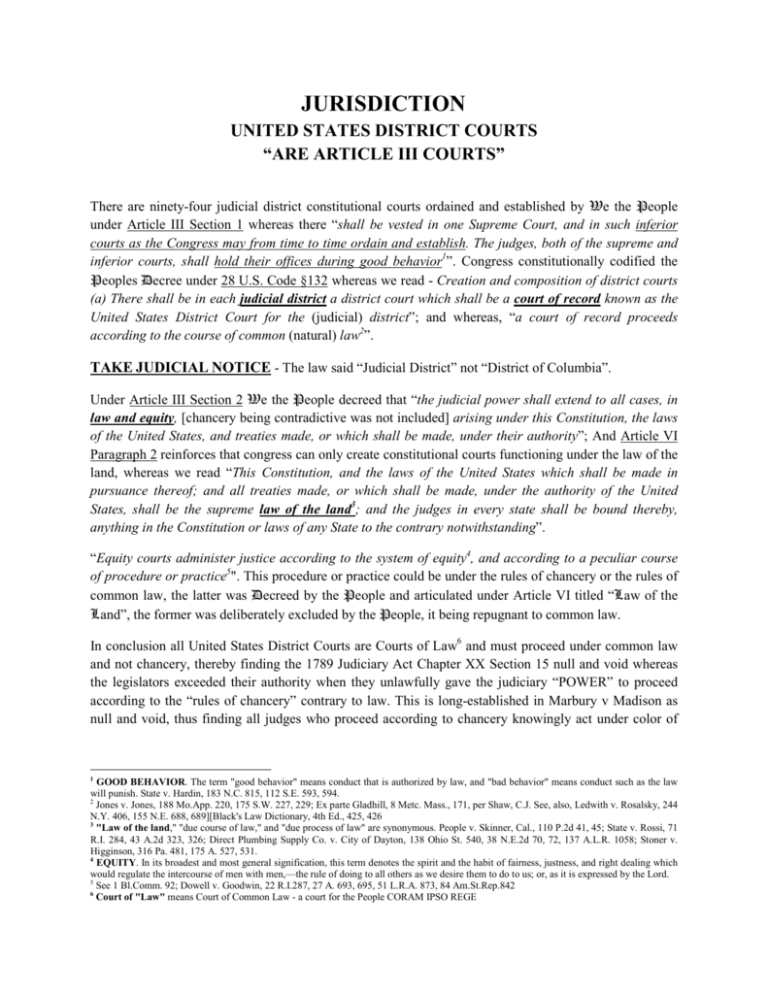
JURISDICTION UNITED STATES DISTRICT COURTS “ARE ARTICLE III COURTS” There are ninety-four judicial district constitutional courts ordained and established by We the People under Article III Section 1 whereas there “shall be vested in one Supreme Court, and in such inferior courts as the Congress may from time to time ordain and establish. The judges, both of the supreme and inferior courts, shall hold their offices during good behavior1”. Congress constitutionally codified the Peoples Decree under 28 U.S. Code §132 whereas we read - Creation and composition of district courts (a) There shall be in each judicial district a district court which shall be a court of record known as the United States District Court for the (judicial) district”; and whereas, “a court of record proceeds according to the course of common (natural) law2”. TAKE JUDICIAL NOTICE - The law said “Judicial District” not “District of Columbia”. Under Article III Section 2 We the People decreed that “the judicial power shall extend to all cases, in law and equity, [chancery being contradictive was not included] arising under this Constitution, the laws of the United States, and treaties made, or which shall be made, under their authority”; And Article VI Paragraph 2 reinforces that congress can only create constitutional courts functioning under the law of the land, whereas we read “This Constitution, and the laws of the United States which shall be made in pursuance thereof; and all treaties made, or which shall be made, under the authority of the United States, shall be the supreme law of the land3; and the judges in every state shall be bound thereby, anything in the Constitution or laws of any State to the contrary notwithstanding”. “Equity courts administer justice according to the system of equity4, and according to a peculiar course of procedure or practice5". This procedure or practice could be under the rules of chancery or the rules of common law, the latter was Decreed by the People and articulated under Article VI titled “Law of the Land”, the former was deliberately excluded by the People, it being repugnant to common law. In conclusion all United States District Courts are Courts of Law6 and must proceed under common law and not chancery, thereby finding the 1789 Judiciary Act Chapter XX Section 15 null and void whereas the legislators exceeded their authority when they unlawfully gave the judiciary “POWER” to proceed according to the “rules of chancery” contrary to law. This is long-established in Marbury v Madison as null and void, thus finding all judges who proceed according to chancery knowingly act under color of 1 GOOD BEHAVIOR. The term "good behavior" means conduct that is authorized by law, and "bad behavior" means conduct such as the law will punish. State v. Hardin, 183 N.C. 815, 112 S.E. 593, 594. 2 Jones v. Jones, 188 Mo.App. 220, 175 S.W. 227, 229; Ex parte Gladhill, 8 Metc. Mass., 171, per Shaw, C.J. See, also, Ledwith v. Rosalsky, 244 N.Y. 406, 155 N.E. 688, 689][Black's Law Dictionary, 4th Ed., 425, 426 3 "Law of the land," "due course of law," and "due process of law" are synonymous. People v. Skinner, Cal., 110 P.2d 41, 45; State v. Rossi, 71 R.I. 284, 43 A.2d 323, 326; Direct Plumbing Supply Co. v. City of Dayton, 138 Ohio St. 540, 38 N.E.2d 70, 72, 137 A.L.R. 1058; Stoner v. Higginson, 316 Pa. 481, 175 A. 527, 531. 4 EQUITY. In its broadest and most general signification, this term denotes the spirit and the habit of fairness, justness, and right dealing which would regulate the intercourse of men with men,—the rule of doing to all others as we desire them to do to us; or, as it is expressed by the Lord. 5 See 1 Bl.Comm. 92; Dowell v. Goodwin, 22 R.I.287, 27 A. 693, 695, 51 L.R.A. 873, 84 Am.St.Rep.842 6 Court of "Law" means Court of Common Law - a court for the People CORAM IPSO REGE law7 thereby hijacking their victims to foreign courts of fiction and are in bad behavior without immunity. This was make crystal clear by the following United States Supreme Court case ..."The words 'district court of the United States' commonly describes constitutional courts created under Article III of the Constitution, not the [unconstitutional] legislative courts [operating under chancery] which have long been the courts of the Territories8.” FOR CAUSE9 and LAWFUL REMEDY10 - Violation of Due Process of Law under color of Law: “William Blackstone - a legal maxim - Every right when with-held must have a remedy, and every injury it’s proper redress11.” … “Indeed, no more than an affidavit is necessary to make the prima facie case12.” By the authority of Article III Section 2 federal district Article III courts of record have jurisdiction in “all cases, in law and equity, arising under this Constitution, the laws of the United States, and treaties made, or which shall be made, under their authority;” - Therefore under Amendment V it is the constitutional jurisdiction and duty of this court to protect People from being deprived of life, liberty, or property, without due process of law13; Any Judge or Magistrate that denies said duty under color of law is guilty of a felony. “In the third volume of his Commentaries, page 23, Blackstone states two cases in which a remedy is afforded by mere operation of law. "In all other cases," he says, it is a general and indisputable rule that where there is a legal right, there is also a legal remedy by suit or action at law whenever that right is invaded. And afterwards, page 109 of the same volume, he says, I am next to consider such injuries as are cognizable by the Courts of common law. And herein I shall for the present only remark that all possible injuries whatsoever that did not fall within the exclusive cognizance of either the ecclesiastical, military, or maritime tribunals are, for that very reason, within the cognizance of the common law courts of justice, for it is a settled and invariable principle in the laws of England that every right, when withheld, must have a remedy, and every injury its proper redress14"... "The Government of the United States has been emphatically termed a government of laws, and not of men. It will certainly cease to deserve this high appellation if the laws furnish no remedy for the violation of a vested legal right15." … that statutes which would deprive a citizen of the rights of person or property without a regular trial, according to the course and usage of common law, would not be the law of the land16.” “Henceforth the writ which is called Praecipe (motion to dismiss for any reason) shall not be served on any one for any holding so as to cause a free man to lose his court17”. 7 COLOR OF LAW. [Black's Law 4th edition, 1891] -- The appearance or semblance, without the substance, of legal right. [State v. Brechler, 185 Wis. 599, 202 N.W. 144, 148] Misuse of power, possessed by virtue of state law and made possible only because wrongdoer is clothed with authority of state, is action taken under "color of state law." (Atkins v. Lanning, 415 F. Supp. 186, 188) 8 Mookini v. U.S. , see also Longshoremen v. Juneau Spruce Corp., 324 U.S. 237; Reynolds v. U.S., 98 U.S. 145, 154; McAlister v. U.S., 141 U.S. 174; U.S. v. Burroughs, 289 U.S. 159, 163 9 FOR CAUSE Means for reasons which law and public policy recognize as sufficient warrant for removal and such cause is "legal cause" and not merely a cause which the appointing power in the exercise of discretion may deem sufficient. State ex rel. Nagle v. Sullivan, 98 Mont. 425, 40 P.2d 995, 998, 99 A.L.R. 321. 10 LEGAL REMEDY A remedy available, under the particular circumstances of the case, in a court of law, as distinguished from a remedy available only in equity. See State v. Sneed,. 105 Tenn. 711, 58 S.W. 1070. 11 5 U.S. 137, Marbury v. Madison 12 United States v. Kis, 658 F.2d 526, 536 (7th Cir. 1981); Cert. Denied, 50 U.S. L. W. 2169; S. Ct. March 22, 1982 13 Amendment V - No person shall ... be deprived of life, liberty, or property, without due process of law; 14 5 U.S. 137, Marbury v. Madison 15 Marbury v. Madison, 5 U.S. 137 (1803) 16 Hoke vs. Henderson,15, N.C.15,25 AM Dec 677 17 Magna Carta, Article 34


